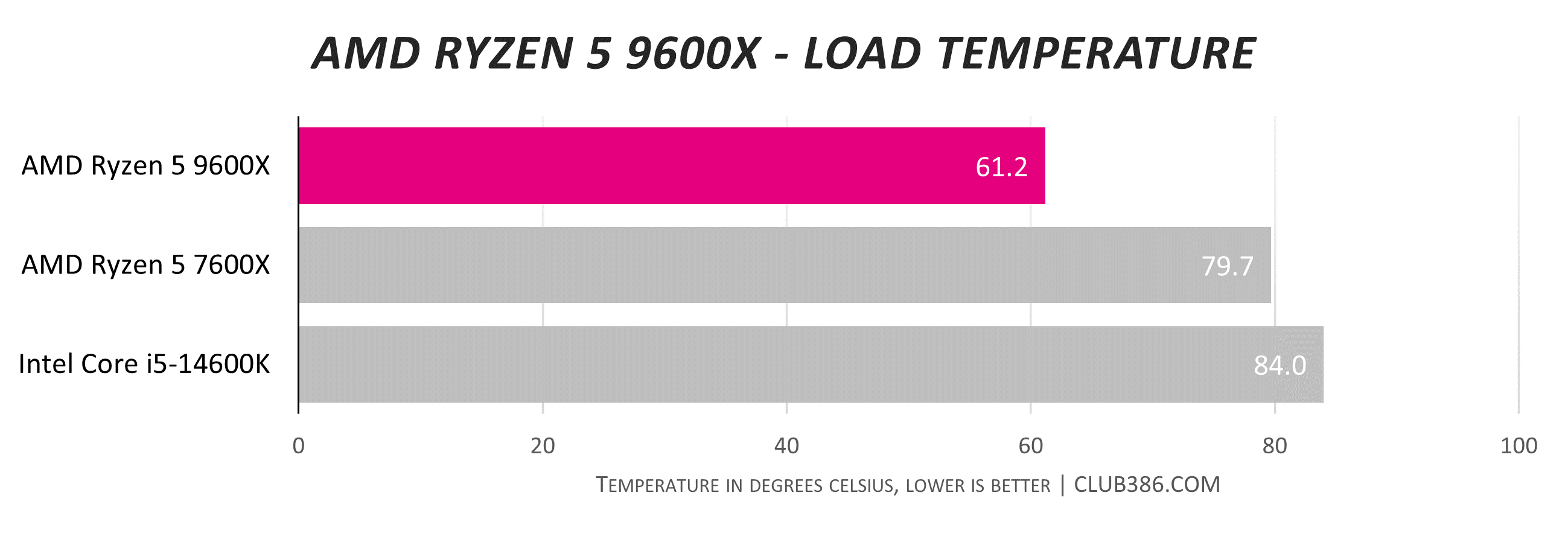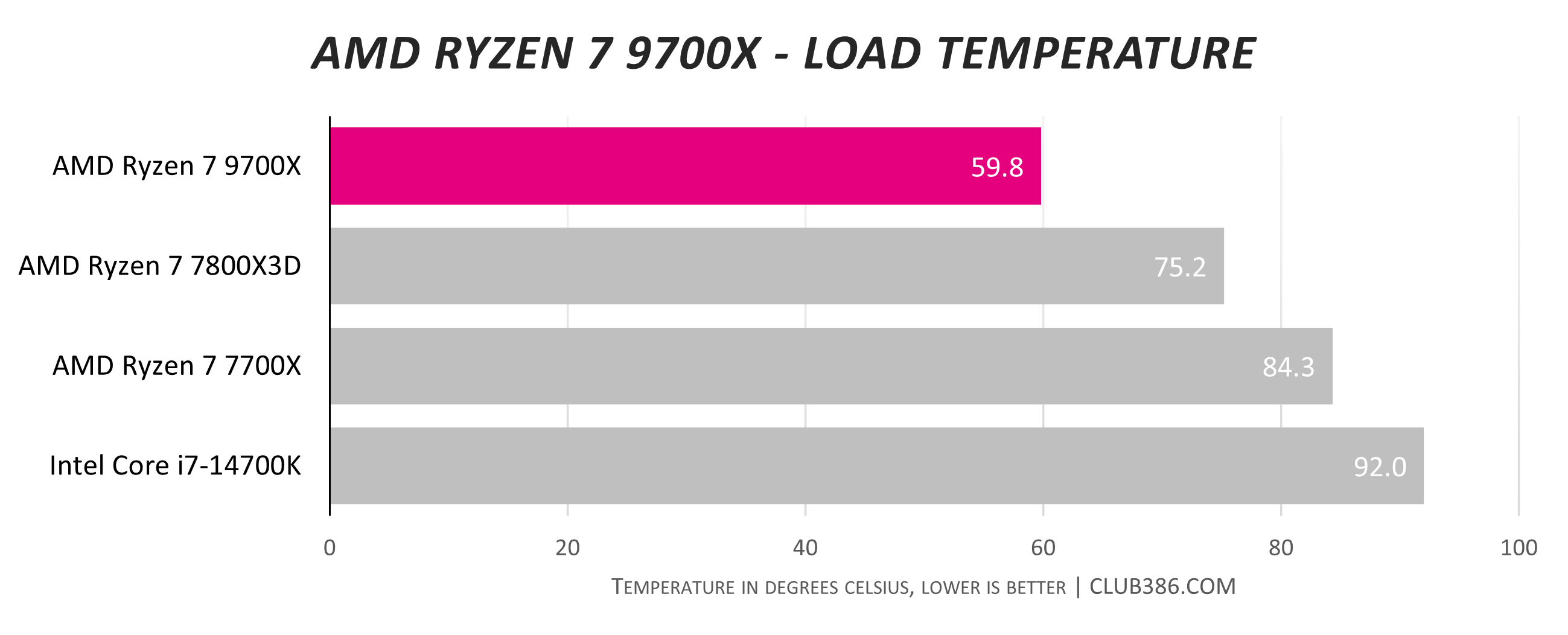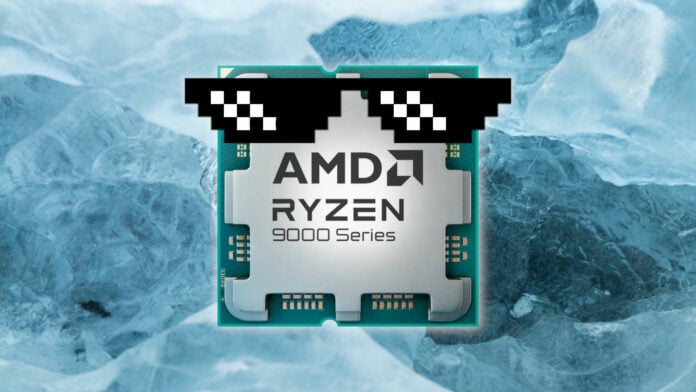The jury’s finally out on the first AMD Ryzen 9000 series processors. Zen 5 has proven itself an intriguing CPU microarchitecture, particularly in terms of efficiency. While its generational performance uplifts are welcome, I can’t help but be in greater awe of its thermal improvements. These are cool chips in every sense of the word.
Reading our Ryzen 7 9700X and Ryzen 5 9600X review, the key qualities of Zen 5 are plain to see. These processors expectedly outperform their predecessors but do so without breaking so much as a sweat. We’re talking temperature reductions well into double digits.
AMD promised Ryzen 9000 would run cooler, and we’re happy to see that come to fruition and then some. With this in mind, let’s have a closer look at how wide the gap is and why it matters.

Operating temperatures and efficiency
A picture is worth a thousand words, so a chart must be somewhere close. Under the same load, we see mid-range Ryzen 5 9600X operate a whopping 18.5°C cooler than a Zen 4 equivalent. This is an astonishing difference, made all the more impressive compared to Intel’s rival chip, Core i5-14600K.
Part of the reason for this gargantuan gap is TDP. For context, Ryzen 5 7600X runs at 105W out of the box. Meanwhile, the 14th Gen Intel Core base power is even higher at 125W, with boost power increasing to 181W. With a focus on efficiency, the Ryzen 9600X sips just 65W from the CPU and 88W from the socket by default, resulting in less heat as a result.

It’s a similar story for the higher-end Ryzen 7 9700X, which also chimes in at just 65W. Granted, it’s not as quick as Core i7-14700K in most productivity tasks, yet that 32.2°C gulf in temperature is significant. It even trumps Ryzen 7 7800X3D, leaving us excited to see how these efficiency improvements translate to Ryzen 9000X3D processors.
Of course, 9000X CPUs are unlocked for overclocking. Suffice to say, you’re free to sacrifice efficiency for extra performance if the latter is your priority. In fact, the 65W TDP can be a detriment in some cases, lowering the ceiling of potential clock speeds. As Tarinder notes in our review: “I can’t help but feel AMD ought to have launched it at 105W because the foundational power of Zen 5 is clear to see.”
Soon, Ryzen 9 9900X and 9950X will demonstrate what Zen 5 can do with more watts and cores. We’re expecting impressive results from those processors at their higher TDPs of 120W and 170W, respectively.
How are Ryzen 9000 thermals beneficial?
Taking the above figures in isolation doesn’t completely illustrate the benefits offered by Ryzen 9000 thermals, of which there are several.
Firstly, and most pertinently to many purchasers of Ryzen 7- and 5-class processors, is the cost of cooling. We achieved 60-61°C operating temperatures on these Zen 5 chips using an Artic Liquid Freezer III 420 AIO water cooler. This is a best-case scenario for these CPUs and demonstrates there’s plenty of headroom to use cheaper, less performant cooling solutions. The same cannot be said so confidently for Ryzen 7000X and, especially, Intel 14th Gen Core.
Lower operating temperatures should beget longer lifespans, too. Electricity can be both the making and undoing of any component; just look at Raptor Lake processors. Burnout is a real concern for CPUs, but there’s seemingly little risk of that with Ryzen 9000X at stock TDPs. The value of a component is partly determined in the immediacy of its purchase but cemented in its longevity. Zen 5 looks to fulfil both criteria in spades, much as we’ll only be certain of the latter via hindsight.
Finally, as summers grow hotter the need for cooler processors grows. Club386’s Fahd regularly sits in 30°C+ heats that aren’t ideal for gaming. While he does undervolt his hardware to create a more comfortable environment, Ryzen 9000 thermals present an enticing alternative to him. Even if Ryzen 5 9600X and 9700X can’t keep up with Intel across the board, they’re in another league when it comes to thermals. Sometimes comfort has to come before performance.
Ryzen 9000 looks to steer the best CPU conversation in a welcome direction that puts greater importance on thermals and efficiency. While brute-force wattage still has a place in the market, the elegance Zen 5 presents in its performance is undeniable.


